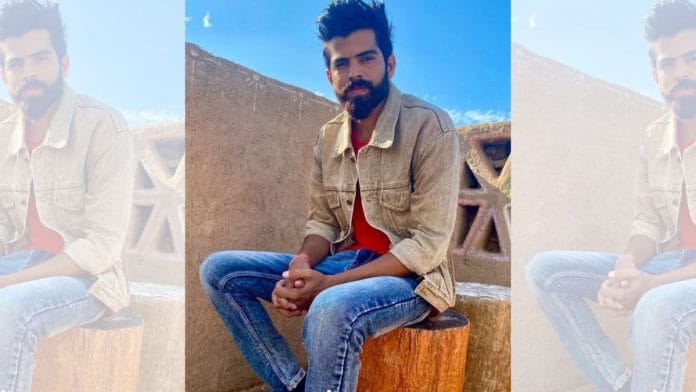Gurugram: Haryanvi singer Masoom Sharma, whose songs were removed from YouTube for allegedly promoting gun culture and hooliganism, has questioned why a track titled Tadke Paavegi Laash Nahar Mein (The body will be found in the canal in the morning) was spared.
The Haryana government’s decision to ban three of Sharma’s songs has sparked controversy with several Haryanvi singers rallying behind him, questioning why his songs were taken down while others with similar themes have been allowed to remain online.
The three banned tracks—’Tution Badmashi Ka’, ‘60 Mukadme’, and ‘Khatoa’—were removed from YouTube last week for allegedly glorifying gun culture, an issue that has been a growing concern, particularly in neighbouring Punjab, where similar trends have been observed among music artists.
Additionally, the state government has also banned two other songs by Haryanvi singers Ankit Balian and Narendra Bhagana, citing concerns over their promotion of gun culture and hooliganism.
Masoom Sharma, though, has been the most affected, with three of his songs being banned.
In a Facebook live session on 15 March, The singer had accused a government official from the state publicity department of targeting him “out of personal enmity”, though he did not outright name the official.
Speaking to the media Wednesday, Sharma left no doubt about who he was referring to. He specifically pointed to the song ‘Tadke Paavegi Laash Nahar Mein’, sung by Gajender Phogat—who currently serves as the Officer on Special Duty (OSD) in the publicity wing of Haryana CM Nayab Saini.
In response, Phogat told media persons, “He (Sharma) is doing this for cheap publicity. I am an easy target for artists. I have not gotten anyone’s song deleted. Songs are being deleted by the cyber cell, and I have no role in this. Only those songs that the police department’s cyber cell has objections to have been removed.”
A senior official from the state publicity department, who spoke to ThePrint on condition of anonymity, has denied Masoom Sharma’s allegations.
Singer and rapper Kulbir Danoda (KD) said in a Facebook post on 16 March, “Every initiative taken by the government and administration for social reform is welcome, as long as it is not part of a conspiracy. Because the goal was to reform society, not to settle personal grudges.”
The crackdown follows a law-and-order review meeting held in Karnal two months ago, where Chief Minister Nayab Saini expressed concerns over Haryanvi singers promoting gun culture and influencing youth toward crime. At the time, CM Saini directed the police to monitor songs that glorify weapons and drug abuse.
Also read: Haryana has no patience for woke narrative on drug abuse and trade. It’s a war
‘Ban should not just target Haryanvi artists’
Masoom Sharma, a 33-year-old Haryanvi singer, is widely recognized for his 2023 EP Rupa. Known for his contributions to Haryanvi pop music, he has released several popular tracks, including Jap Naam Bhole Ka (2021), 2 Numbari (2021), Gunde Te Pyaar (2021), Tuition Badmashi Ka (2022), Bhagatt Aadmi (2022), Ek Khtola Jail Ke Bhitar (2023), Badmashan Kaa Byah (2024), and Lofar (2024).
In 2022, Masoom Sharma released his song on SYL Haryanvi in response to Sidhu Moosewala’s posthumous song about the Sutlej-Yamuna Link (SYL) canal dispute.
Sharma has strongly opposed the ban on his songs and, in his Facebook Live session, claimed that he was targeted by the official—now in a high-ranking government position—who misused their authority to settle an old dispute with him.
“My songs are being banned for allegedly promoting hooliganism, but some artists are passing off vulgarity as folk music. They should also be banned. Many singers make songs about married women, daughters-in-law, and girls, which negatively impact society. There are numerous double-meaning songs, yet no action is taken against them,” he said. “If Haryanvi songs are banned, youth will start listening to Punjabi songs. The government should ban all songs that promote gun culture, including Punjabi songs. It should not just target Haryanvi artists and take away our livelihoods.”
“During a single song shoot, over 100 people get employment, earning Rs 800-Rs 1,000 per day. If their work is stopped, will the government provide them jobs? If the government works without bias, I will stop singing songs about hooliganism and start singing bhajans instead,” he added.
On social media, people are questioning the government’s selective action, naming singers like Amit Rohtakia, Ajay Hooda, and Hemant Fauzdar and asking why their songs promoting hooliganism and gun culture have not been banned.
Meanwhile, the hashtag #ISupportMasoomSharma is trending, but the government has yet to respond.
(Edited by Zinnia Ray Chaudhuri)
Also read: Khap calls for ‘social boycott, ban’ on live-in relationships in Haryana minister’s presence






